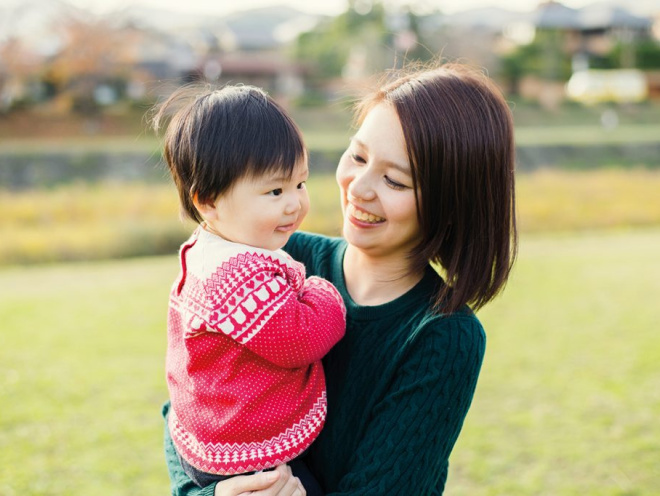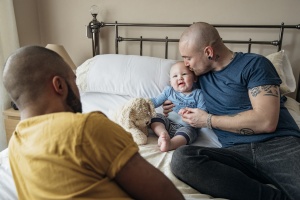Your baby will be developing quickly at this age: babbling, gesturing and recognising some words. Here’s what to expect and 10 tips for encouraging them.
Understanding your child’s language development can help you to learn how to respond to their needs supportively. The good news is that the more babies experience conversation and language, the more effective and confident they become in their own communication. So go ahead, talk and sing to them, even if it’s just about what you’re looking at in the supermarket.
Beginning to communicate
Your baby will start to listen more carefully at around six months old, and look at you when you speak and when you call their name. Children generally use gestures to communicate before they use words, often between nine and 12 months. These gestures can be a sign of the early stages of spoken language, so look out for them.
Communication and speech development in children
Children develop skills at different rates but by one year, they will usually:
- listen carefully, and turn to someone talking on the other side of the room
- look at you when you speak and when their name is called
- as a part of baby speech and language development, children will babble strings of sounds, like ‘no-no’ and ‘go-go’
- make noises, point and look at you to get your attention
- smile at people who are smiling at them
- start to understand words like 'bye-bye' and 'up' especially when a gesture is used at the same time
- recognise the names of familiar objects, things like ‘car’ and ‘daddy’
- enjoy action songs and rhymes and get excited when sung to
- take turns in conversations, babbling back to an adult.
(Talking Point, 2013a)
Speech and language skills develop from a very early age. Yet some children don’t develop the early skills they need. This can be very difficult to spot from an early age but do talk to a GP or health visitor if you have any concerns or if your child does not:
- respond to noises by nine months
- point to things they are interested in by one year
- try to gain your attention by making noises or through eye contact, facial expressions or reaching by one year.
(Talking Point, 2013b)
10 tips for how parents can encourage language development
Here are some of the many things you can do to encourage your child's language development at this stage:
- Make different sounds to interest your child. This can be the sound of your voice or things like a rattle or squeaky toy.
- Pointing to sounds to help develop your child’s listening skills. This will also help their awareness of the world around them.
- Also point to and name things you can both see, e.g. ‘Look, a dog.’ As they get more familiar with words, you can add more details, e.g. ‘Look, a big dog.’
- Encourage your child to look at you during activities, such as when they’re dressing, feeding or nappy changing. This will help your child's attention and communication skills.
- Talk about everyday activities, like getting dressed, eating and bathing.
- Copy your baby when they babble. This is a very good way to show how to take turns in a conversation. This will encourage them to make even more sounds.
- Use actions with words. Try waving as you say 'bye-bye' or picking up their cup as you say 'drink'. This will help your child to relate what they see and do with language.
- Sing action songs and play games like ‘peek-a-boo’ and ‘round and round the garden’ to encourage communication and attention skills.
- Have some special time with your child each day to play with toys and picture books.
- Try to avoid giving your baby a dummy during the day as this can discourage speech. Give it only at bedtime, and try to lose it entirely by one year.
(I CAN, 2010; NHS, 2017; Best Beginnings, 2019)
This page was last reviewed in October 2017.
Further information
Our support line offers practical and emotional support with feeding your baby and general enquiries for parents, members and volunteers: 0300 330 0700.
You might find attending one of our NCT New Baby groups helpful as they give you the opportunity to explore different approaches to important parenting issues with a qualified group leader and other new parents in your area.
Make friends with other parents-to-be and new parents in your local area for support and friendship by seeing what NCT activities are happening nearby.
You can also find lots of useful information and resources from I CAN.
Read The Psychology of Babies: How relationships support development from birth to two by Lynne Murray (published by Constable Robinson).
Take a look at the National Literacy Trust’s website which has information about early communication skills.
Best Beginnings. (2019) Videos. Caring for your baby / talking and singing. Available from: https://web.bestbeginnings.org.uk/web/videos/caring-for-your-baby/talking-and-singing [Accessed 1st October 2018]
I Can. (2010) Talk together. http://www.talkingpoint.org.uk/sites/talkingpoint.org.uk/files/Talk%20together%202010.pdf [Accessed 1st October 2018]
NHS. (2017) Help your baby learn to talk. Available from: http://www.nhs.uk/Conditions/pregnancy-and-baby/Pages/helping-your-childs-speech.aspx [Accessed 1st October 2018]
Talking Point. (2013a) 6-12 Months. Available from: http://www.talkingpoint.org.uk/ages-and-stages/6-12-months [Accessed 1st October 2018]
Talking Point. (2013b) Things to look out for. Available from: http://www.talkingpoint.org.uk/ages-and-stages/6-12-months/things-look-out [Accessed 1st October 2018]








